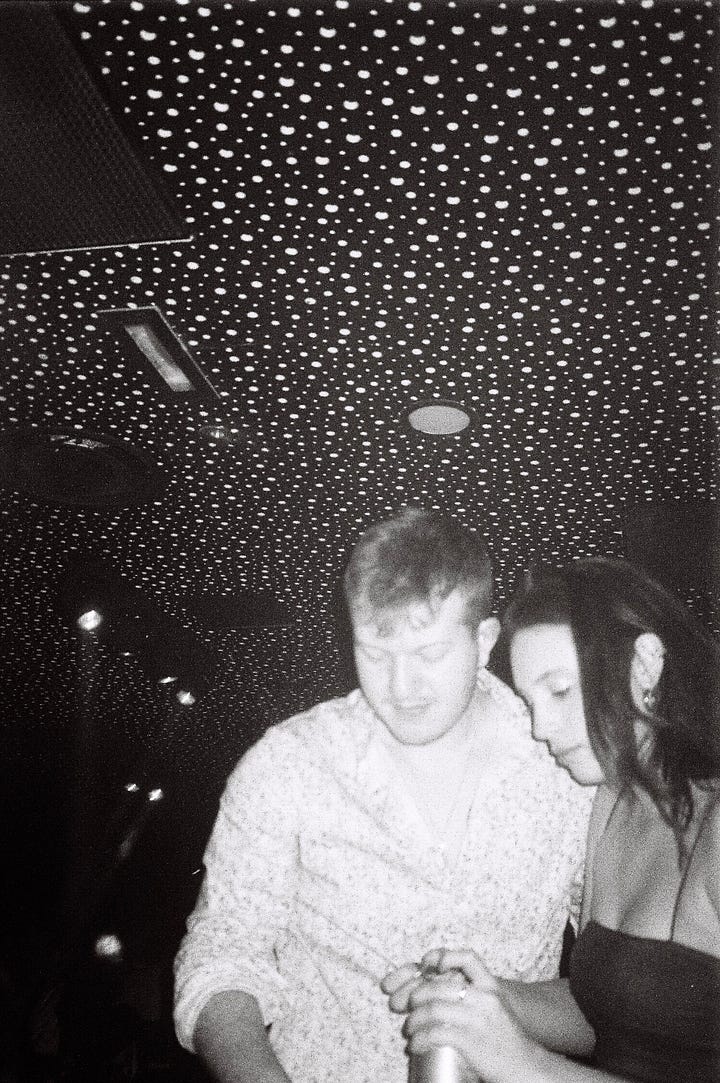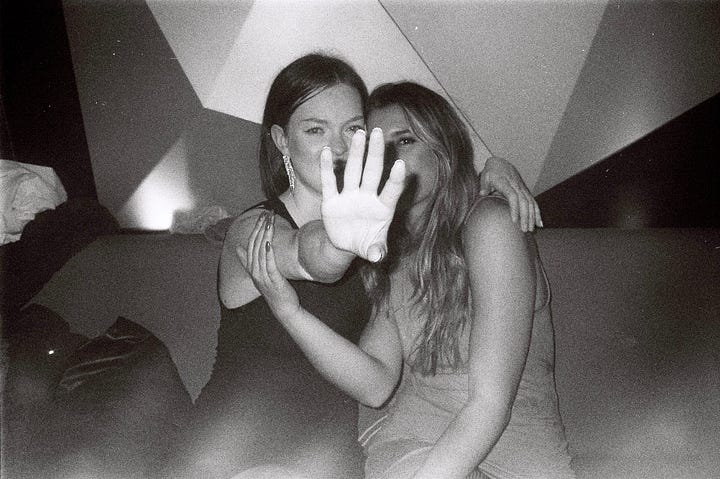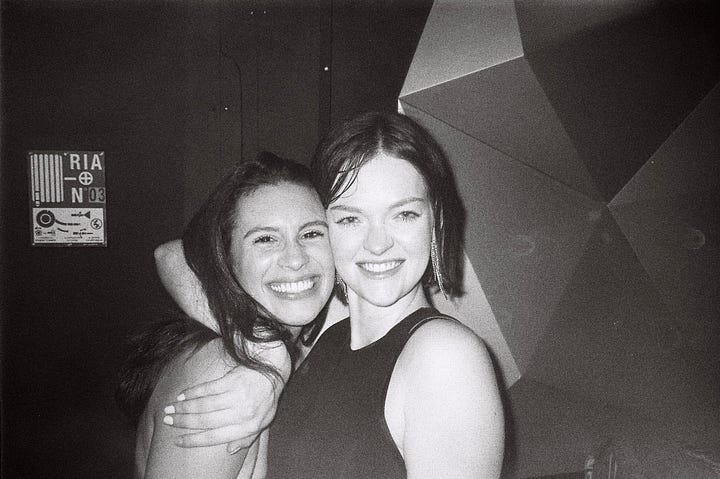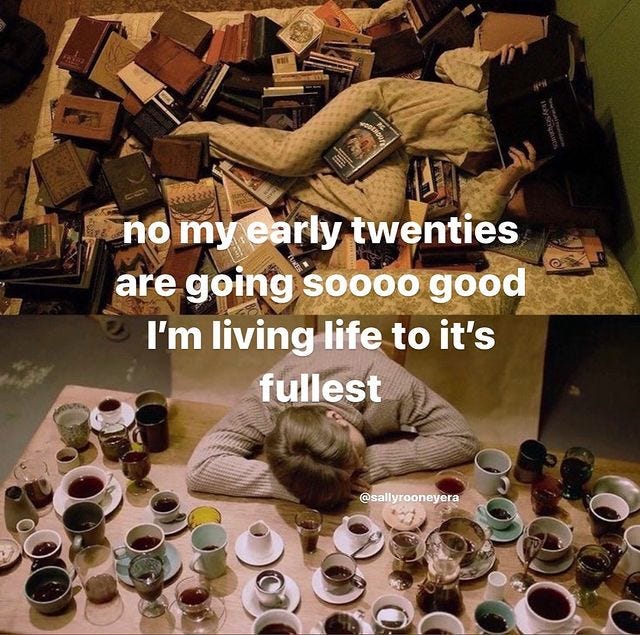Hi, everyone—80 subscribers, wow! I’m still digging myself out of a pile of work deadlines, so this is an essay I wrote for my undergraduate thesis a few years ago that only six people in the world have read, by my estimate: my mom, my ex, both of my thesis advisors, and two Kemmerers.
I was reminded of it this week because the temperature dropped in Austin again. I’ve been keeping my window open, and Milo loves sniffing against the screen on his hind legs, which obviously terrifies me. I have a recurring nightmare that he somehow slices through the screen and falls to his death.
So far, he’s only managed to tear a few tiny holes with his claws, and no bugs have made it five floors up. But if there were “people-seeds,” like in Judith Jarvis Thomson’s famous thought experiment, I would be screwed. (Content warning: I discuss sexual assault, domestic violence, and mass shooting events in this essay.)



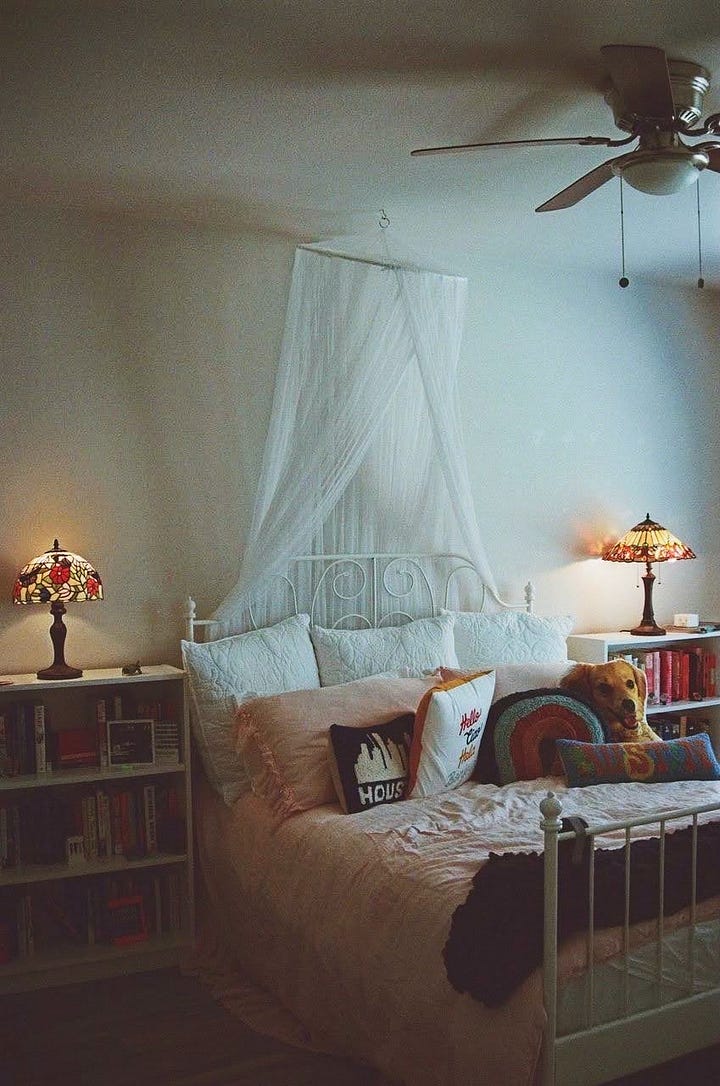

In the fall of 2021, I lived in a blue house with a red door. My room was on the first floor, and I had two housemates who lived upstairs. After sharing a bathroom with at least twenty other girls for most of college—in a campus dorm and then a sorority house—I considered this to be my first time living independently.
I was rarely home at the same time as my roommates, so it often felt like I had the whole house to myself, especially when I would come home late from work at the ice cream shop down the street. This felt liberating or frightening, depending on the day.
I finally had my own bathroom and kitchen, a pantry and a patio. All that space felt like a respite from the chaos of campus life, but I still spent lots of time at my then-friends’ apartments, which were only a short bus ride from 35th Street. When it was past midnight, someone was always willing to drive me home so that I didn’t have to take the bus alone.
I love the bus, but there will always be a trade off implicit in my decision to travel alone on public transportation, as much as I wish there didn’t have to be. I’m not naïve to the risk I assume as a woman moving through a city on my own.
In Paris, the buses run all night, and I once made it home from the club by myself while near-blackout drunk. I vaguely remember making out with a guy who tried to put me in his Uber, but I had enough of my senses about me to laugh him off. The next day, my friends were furious with me for leaving alone, but the night before they had been in similar states, and I had had an intoxicated confidence that I could fend for myself. Things might have ended very differently.
I bought a fancy little personal alarm from an Instagram ad that I clipped onto my backpack for a time, but I accidentally set it off in too many inappropriate places. I fear I would do the same if I carried pepper spray on my keychain, so instead I just hold my keys through my fist like makeshift brass knuckles and pretend to talk with someone on the phone to suggest a witness to any potential crime. Every girl passes these techniques between us like shibboleths.
I started putting door jammers in place at night against burglars when I was home alone at the blue house because my room was closest to the front door. I wonder how much I spend per year on being a woman, from period products to personal safety. The door jammers were $45.38 on Amazon, with free two-day shipping. This is an insidious version of “the pink tax,” in which products marketed to women tend to cost more. It’s expensive, both materially and psychologically, to live with vulnerability endemic to one’s existence.
The streets were quieter in North Campus, but we lived a few hundred feet from a main thoroughfare and two busy bus stops. Our neighbor’s moped was stolen off of her driveway, and my housemate Callie had a bag stolen out of her car while she was moving in. She brought our patio furniture inside for a week or two after the moped disappeared, but eventually she decided that the Target table-and-chair set was hardly valuable enough to be stolen.
I didn’t feel any more unsafe in that house than I did walking closer to campus—where a 2017 report found that 15 percent of female undergraduate students reported having experienced rape since their enrollment at UT Austin. In fact, I felt safer on the streets of Paris than in West Campus. But part of this comes from a false sense of exceptionalism. I have to believe that the horror stories are exceptions, not the rule, or else I might never leave my room or say hello to a stranger.
When one of my friends was groped in her apartment elevator, she couldn’t meet her boss to pick up her paycheck because she needed to file an incident report. While we sat with her, waiting for the police to arrive, I couldn’t stop thinking about the simple inconvenience. A man had the audacity to presume access not only to her body, but also to her time and energy. His bail was set at $10,000, but only because the police found out he was also wanted on drug charges when they were able to identify him from the security camera footage.
Besides the obvious horror of physical violence, there are added burdens of womanhood—expenses and inconveniences—like paying for an Uber just to be safe instead of simply walking the half-mile distance home, or always trying to have at least $500 in savings in case a friend ever needs an abortion and can’t afford it.
Though after the fall of Roe v. Wade, I suppose I would also need to budget for travel expenses. The nearest abortion provider is at least a seven-hour drive from Austin. Nearly half of abortion seekers live below the poverty line.
Forced pregnancy is a lot like breaking and entering. The philosopher Judith Jarvis Thomson has a famous thought experiment in her essay “A Defense of Abortion” that’s along these same lines, about unwanted pregnancies in the case of contraceptive failure. She imagines a world in which people-seeds drift about in the air like pollen, and if you open your windows, one may drift in and take root in your carpets or upholstery.
You don’t want children, so you fix up your windows with fine mesh screens, the very best you can buy. As can happen, however, and on very, very rare occasions does happen, one of the screens is defective, and a seed drifts in and takes root.
Thomson argues that you don’t have a duty to let the seed gestate on the floor of your house just because one happened to get through your screens—even if you voluntarily opened your windows, knowing the very small chance they would not hold. In the same way that one’s right to control what happens on one’s own property would trump the person-seed’s right to life, women and pregnant people should have the right to control what happens in our own bodies.
I think a lot about whether I want to have children and what kind of a mother I would be. Motherhood feels sacred, a responsibility for which I do not yet feel ready. I would never want to bring a child into the world for lack of freedom. I want a supportive partner, paid parental leave for each of us, a planet that isn’t burning, bodily autonomy. Sometimes this all feels like too much to hope for. Every time I see a mother eulogizing her elementary schooler on national news, my fear spikes for my future family.
I heard the news about the 2023 Covenant School shooting in a text from my mom. We fully convinced ourselves that our dear friends in Nashville had children at the school that day. I had to call in sick from class because I was crying so hysterically. It turned out that only one of their children had gone to Covenant for preschool, but none of them were currently enrolled. My latent fear had become visceral and personal for the first time, and now it won’t leave my body.
The usual refrain from politicians advocating for legislation like the Equal Rights Amendment or the Violence Against Women Act—the latter of which 172 Republicans voted not to reauthorize in 2021—is to think of one’s mother, sister, wife, or daughter. But that’s about as reductive and ineffective as raising up the children who have been murdered in acts of gun violence. Women are people, deserving of rights and safety, independent of their relationship to men in power. And conservative lawmakers demonstrated they didn’t care about American children after Sandy Hook and in the 11 years since in which they’ve blocked nearly every effort at gun control.
These are not unrelated issues: One of the most fundamental gun reform measures would be requiring background checks for all gun sales, closing the federal loophole that allows unlicensed sellers to put guns in the hands of domestic violence offenders and others with histories of violence or mental instability. A disproportionate number of domestic violence victims are women. According to the Giffords Law Center, when an abusive partner has a gun, the victim of domestic violence is five times more likely to be killed. Every year, more than 600 American women are shot to death by intimate partners—roughly one woman dead every 14 hours.
One night, walking home after a closing shift at Amy’s Ice Cream, I had a gun pulled on me. Under the fluorescent lights of the laundromat on our corner, a young boy carrying a duffel bag turned around and flashed the pistol that was tucked in the palm of his hand. I sped up but tried not to seem like I’d noticed or wanted anything to do with him. He looked more scared of me than I could have been of him. I waited until I had put my door jammers in place before I called the police.
I loved that little blue house, and I love the strange and strong body that I also call home. I just wish feeling safe inside either of them didn’t feel like a full-time job—one that I’m paying to perform. Time is money, too; I think about how my friend lost a whole afternoon talking with the officers and calming herself down, and then she still had to find a new time to meet with her boss.
I think about the space in my brain taken up by an internal monologue of constant vigilance, that I wish I could devote instead to committing my favorite poems to memory or building a better world for the child I might have someday.
I imagine myself having a daughter. I’d give her a name that’s chic and classic, like Charlotte or Frances, one with plenty of good nicknames. Maybe she’ll have my same middle name, after my mother. Maybe she’ll have a younger brother.
I’ll recite Whitman to her before she’s even said her first word. When she’s old enough to appreciate it, I’ll play her Dead Poets Society, and I’ll stop the movie before she sees the gun. The crowd will applaud, and the powerful play will go on and on.
FOOD FOR THOUGHT
Palate Cleansers
The following SNL skit is hilarious if you get it and probably disturbing if you don’t, but it gives us the delightful vignette of heartthrob Timothée Chalamet and the members of Grammy-nominated band boygenius flashing the world dressed as bad Troye Sivan impersonators:
On Rebecca Yarros’ lack of literary merit
I read all 600 some-odd pages of Iron Flame this week, after similarly devouring Fourth Wing. The sequel did not deliver on its potential, though it’s still probably worth the read if you liked the world of the first book.
Rebecca Yarros can write a mean, tight plot, but she is not a serious writer. Her dialogue, character development, and prose are quite frankly sloppy to have been published at such a scale, and it kills the editor in me whom I can never fully silence.
The first part of the book was a good start, and with the further attention it desperately needed, I think it could have stood alone as a successful second installment in the series. The second part of the book felt half-baked, however, and the ending came so far out of left field that it seriously disrupted my trust as a reader.
As I was reading, it seemed obvious to me that these should have been two separate books. It turns out this was her instinct as well, according to an interview she gave after the book was published, but her editor persuaded her to combine them into one novel. That is such a failure of responsibility.
Read my review of Fourth Wing below, then proceed with caution to its sequel:
The Swelce Dispatch
Perhaps the most important cultural moment of this week was Taylor Swift’s boyfriend Travis Kelce attending the Eras tour in Buenos Aires, Argentina. I haven’t been this invested in a celebrity relationship since Phoebe Bridgers dated Paul Mescal. I’ve collected the highlights for you below because I take my responsibility as a cultural correspondent very seriously and will put my journalism degree to good use.
Artichoke Heart behind the scenes
